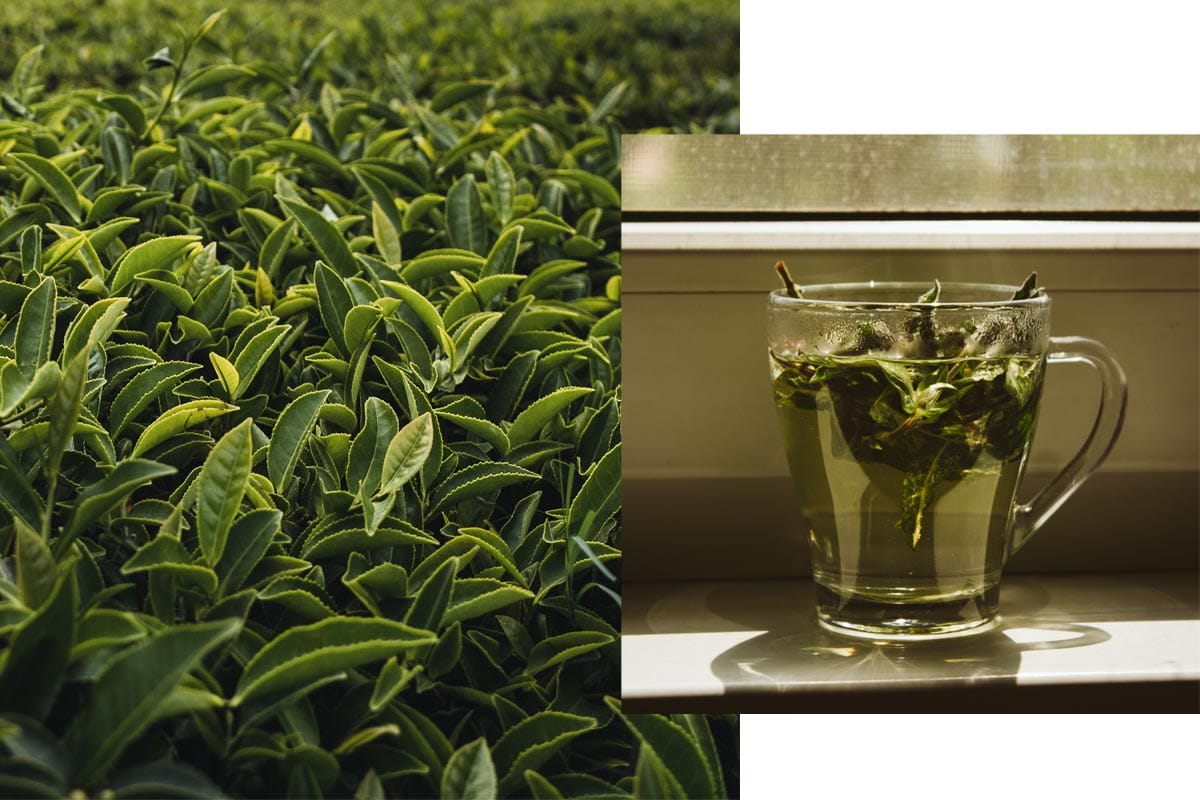
When we talk about 'wellness', we think about things that nourish the mind, body and soul - things like gua sha and turmeric. One other product that certainly fits the bill is green tea. This simple leaf is one that comes with history, ancient ritual and also amazing restorative properties.
Green Tea has been used as a staple for health in traditional Chinese Medicine for thousands of years owing to its high levels of antioxidants and its ability to increase qi (the flow of vital energy) in the body. To find out more about the health benefits, the mental effects and history of green tea, we spoke to Tara Lang, Wellness and Health Specialist for X50 Lifestyle. Here, she explains why green tea is more beneficial than other forms of tea and its roots and importance in Chinese Medicine.
What is green tea? How does it differ from other types of tea?
Green tea, surprisingly, like any other tea, comes from the Camellia sinensis plant. Ultimately, the variety of the tea plant and how the tea leaves are processed determines what makes tea “green”. Green tea leaves are harvested and heated— pan fried or steamed—then dried to prevent oxidation. Green tea is considered to have originated in China and possesses significant cultural, medicinal, and spiritual meaning.
Green tea is said to be beneficial for physical health. Why is that?
The many types of green tea offer different benefits. One type of green tea, pu erh cha can is used to reduce cholesterol while oolong cha might be used to help regulate blood pressure. Green tea’s claim to fame though is its high level of polyphenols (antioxidants). We know antioxidants, that protect against oxidation/degradation, to be powerful allies for all things health and beauty.
While modern studies absolutely support health claims including reduced inflammation, brain function, and even cancer-fighting effects, TCM (Traditional Chinese Medicine) has lauded green tea’s benefits for centuries. In TCM, raw green tea is cooling. The processing of green tea however converts this cooling property into a neutral or warming property. The darker the tea, the more warmth it offers - warmth generally means stimulated circulation, digestion, and so on.
How does this compare to other forms of tea, let’s say black tea?
Though originating from the same species, the processing of the leaves is what sets green and black tea apart. To produce green tea, freshly harvested leaves are immediately steamed to prevent fermentation. The longer the fermentation, the darker the tea. Generally black tea contains lower levels of polyphenols (the good stuff). Green tea also contains less caffeine.
What sorts of benefits might we experience from drinking green tea?
TCM has lauded green tea as a preventative measure against disease for more than 2000 years. Green tea’s potent compounds offer protective antioxidant benefits that range from clearing out heavy foods and toxins and increasing energy and longevity (associated with increased qi in TCM).
Studies have shown green tea to contain active compounds including theanine (calming effect), tryptophan (associated with sleep), lysine (anti-viral), and minerals and trace elements like calcium, magnesium, chromium, manganese, iron, copper, zinc, selenium, sodium, phosphorus, potassium and others. These compounds play crucial and synergistic roles in cellular function - in layman's terms: overall health and function of cells which determines well-being and beauty.
How much do we need to drink to reap the rewards?
That depends on the person’s tolerance for caffeine, in my opinion. Some say three to five cups per day. But you might want to stick with two if you’re sensitive. “Too much of a good thing” applies in the instance of green tea as well.
Can these benefits extend beyond the physical? Are there mental health benefits to drinking green tea too?
Monks often drink green tea before meditating; it’s said to calm the spirit. Due to green tea’s L-theanine compounds, this makes plenty of sense. L-theanine plays a role in calming anxiety and the production of grounding alpha waves in the brain. It can also increase dopamine and benefit aspects of brain function, including mood. In terms of broader mental health - think clarity, focus, and long term brain health without some of the negative side effects (dehydration, jitters) of coffee.
Can green tea aid the body in weight management?
Studies do point to the tea leaf’s impact on obesity and diabetes. To keep it simple, yes, the consumption of green tea may help reduce body weight, mainly body fat. In terms of weight management, incorporating iced green tea into your diet to replace juices, soft drinks (or whatever your vice is), not only gives you a kick of antioxidants and the benefits associated, but also reduces your calorie intake. My recommendation is the X50 Fresh Tea, which is a powdered green tea with added deep-sea Marine Collagen for skin, hair and nails and Chaga and Lion’s Mane Mushrooms to help improve gut microbiota, boosts beneficial bacteria, digestion and absorption of nutrients. Just add cold water and you’re good to go.
Are there any misconceptions around green tea?
Perhaps that most notable misconception is that green tea is “different” to other teas. It’s quite fascinating that green tea’s origins are the same as any other tea. I admire how culturally significant green tea is in Chinese and Japanese culture. The ritual around green tea has tremendous meaning. I might read up on that, if rituals have a place in your daily practice.
I would also suggest buying the best quality tea you can find - stay clear of your average tea bag from the supermarket. Green tea is like wine - the complexities around the processing and care of the tea leaves makes for very different drinking experiences. The more care you take in sourcing, the more appreciation you have, and likely the more benefits you’ll reap. Look for brands valuing sustainable, natural, and traditional practices like X50 who formulate with naturopaths, are all natural and don’t use preservatives, synthetic sugars and ‘filler’ ingredients.



